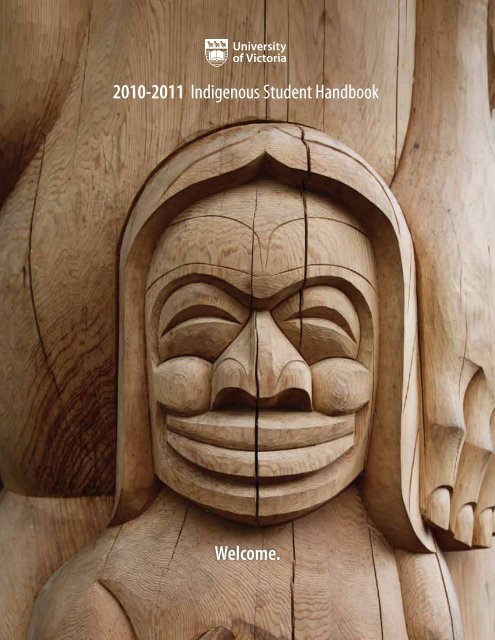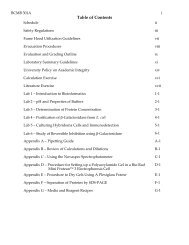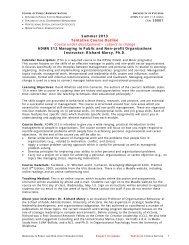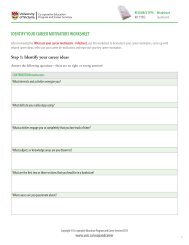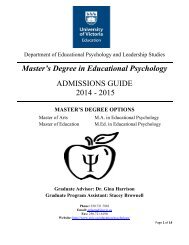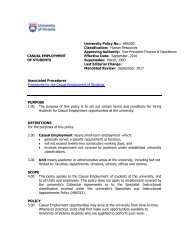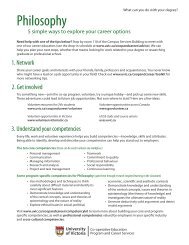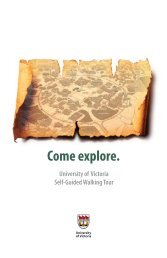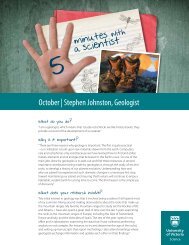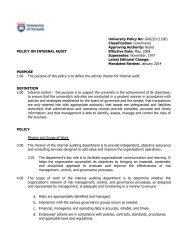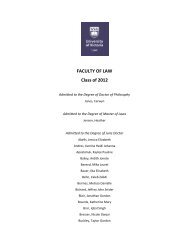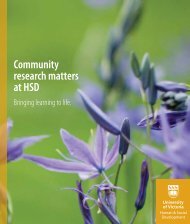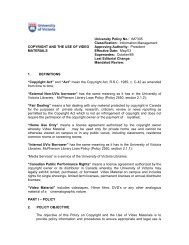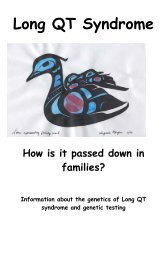Download - 24 pages (1.17 MB) - University of Victoria
Download - 24 pages (1.17 MB) - University of Victoria
Download - 24 pages (1.17 MB) - University of Victoria
You also want an ePaper? Increase the reach of your titles
YUMPU automatically turns print PDFs into web optimized ePapers that Google loves.
2010-2011 Indigenous Student Handbook<br />
Welcome.
Snapshots – life at UVic<br />
Here are a few snapshots <strong>of</strong> the people, activities and events that are part <strong>of</strong> UVic’s Indigenous community.<br />
“Give to the next generation” -Alex Nelson, alumnus<br />
UVic alumnus Alex Nelson (Musqamaqw Tsawatainuek First Nations <strong>of</strong> Kingcome Inlet, British Columbia) runs through<br />
Mystic Vale, an old-growth forest on the edge <strong>of</strong> campus. Alex graduated with a Bachelor <strong>of</strong> Arts degree in leisure<br />
studies administration in 1997 and has put his degree to good use—today he is CEO and President <strong>of</strong> the Aboriginal<br />
Sports and Recreation Association <strong>of</strong> BC and the President <strong>of</strong> the North American Indigenous Games Council. “My<br />
responsibility is to give to the next generation what life has given to me,” he says.<br />
Indigenous graduates are honoured<br />
Micky Sampson (Tsartlip nation) <strong>of</strong> the Esquimalt Singers and Dancers performs during one <strong>of</strong> UVic’s Indigenous<br />
student recognition ceremonies. Each year, UVic honours its Indigenous graduates by holding a celebration at the<br />
First Peoples House. Attendees <strong>of</strong>ten wear traditional regalia, including button blankets; cedar hats; ornate capes,<br />
vests and skirts; Métis sashes; ribbon dresses and shirts.<br />
“Make your dreams a reality” -David Dick, alumnus<br />
UVic alumnus David Dick (Songhees Nation) completed his diploma in cultural resource management and says that<br />
his time at UVic has helped him make his dreams a reality. “My goal is to build a Cultural Heritage Centre here in<br />
<strong>Victoria</strong>,” he says. “My diploma program is the only one <strong>of</strong> its kind in North America and it has helped me kickstart<br />
a grassroots foundation to put this into action.” David, pictured here with his spouse Joy and daughter Aiyana,<br />
envisions the centre as a gathering and sharing space for both Indigenous and non-Indigenous people.<br />
Learning and teaching in an Indigenous world<br />
Students have the opportunity to deepen their experiences with an inclusive and holistic new course at UVic. To<br />
celebrate Indigenous ways <strong>of</strong> teaching, knowing and sharing, UVic <strong>of</strong>fers EDCI 499: “Learning and Teaching in an<br />
Indigenous World”— a six-part course series based on Indigenous pedagogy. In the most recent course in the series,<br />
“CÁ E TTE SNEWEL” or “Working on the canoe,” students are studying and experiencing the Straits Salish culture<br />
and language by creating a traditional W’SANEC dugout canoe and individual paddles under the guidance <strong>of</strong> UVic<br />
instructor Nick Claxton, W’SANEC carver Perry LaFortune and local Indigenous knowledge keepers.<br />
“Gain wisdom as well as knowledge” -Terr y Gordon, student<br />
Terry Gordon (left, Métis) believes that attending university is about much more than just getting a degree–it’s<br />
about becoming a good citizen. “It’s important to gain wisdom as well as knowledge,” he says. “You can <strong>of</strong>fer more to<br />
yourself and to your community with wisdom.” The economics and mathematics student has been an active citizen<br />
at UVic, taking part in the LE,NONET peer mentoring program, the Native Students Union, and the Resource Centre<br />
for Students with a Disability.<br />
2
CONTENTS<br />
2 Welcome to UVic<br />
4 On-campus support<br />
8 Academic programs<br />
11 Co-operative Education<br />
and Career Services<br />
12 Faculty members and staff<br />
14 Finances and housing<br />
16 Applying to UVic<br />
17 Questions?<br />
The <strong>University</strong> <strong>of</strong> <strong>Victoria</strong> acknowledges with respect the history,<br />
customs and culture <strong>of</strong> the Coast Salish and Straits Salish peoples<br />
on whose traditional lands our university resides.
Welcome to UVic.<br />
President’s greeting<br />
Welcome to the <strong>University</strong> <strong>of</strong><br />
<strong>Victoria</strong>!<br />
UVic has built a strong reputation<br />
as one <strong>of</strong> Canada’s leading<br />
universities – a university that<br />
provides award-winning teaching<br />
and conducts ground-breaking<br />
research. We <strong>of</strong>fer a unique<br />
learning environment based on<br />
our deep commitment to meeting<br />
the changing needs <strong>of</strong> society and<br />
our growing student body, now<br />
more than 19,000. And ours is a campus<br />
that is noted for its human scale and natural beauty.<br />
We recognize the special role UVic can play in relation to Canada’s<br />
Indigenous peoples. We continue to build on our commitment to,<br />
and our greatly valued relationship with, Indigenous communities.<br />
It is our university’s goal to be the university <strong>of</strong> choice for<br />
Indigenous students. We have enhanced the recruitment, retention<br />
and graduation <strong>of</strong> Indigenous students in all faculties. Our First<br />
Peoples House was opened in January 2010, and it provides<br />
a welcoming space on campus for Indigenous students and<br />
the broader community. It supports the academic, emotional,<br />
spiritual and physical needs <strong>of</strong> our Indigenous students, while<br />
recognizing and honouring the diversity <strong>of</strong> values and beliefs<br />
among Indigenous people. With the publication <strong>of</strong> a major report<br />
on the LE,NONET project, insights and best practices will be made<br />
available to post-secondary institutions in Canada and they will<br />
inform future initiatives at UVic.<br />
It is a pleasure to welcome you to UVic. We want to assist and<br />
support our Indigenous students in making their journey at UVic<br />
a success and hope that you will find this handbook informative<br />
and helpful.<br />
David H. Turpin, CM, PhD, FRSC<br />
President and Vice-Chancellor<br />
Greeting from the Director <strong>of</strong> Indigenous Affairs<br />
Gil’ikasla. On behalf <strong>of</strong> the Office<br />
<strong>of</strong> Indigenous Affairs team and our<br />
Elders, I want to welcome you to the<br />
<strong>University</strong> <strong>of</strong> <strong>Victoria</strong> which is in the<br />
beautiful traditional territory <strong>of</strong> the<br />
Coast Salish. I trust you will find this<br />
handbook helpful as you learn more<br />
about the Indigenous faculty, staff,<br />
programs and services on campus.<br />
The Office <strong>of</strong> Indigenous Affairs<br />
(INAF) team is happy to provide an<br />
orientation to campus and assist you<br />
in every way we can. Our goal is to support you in your experience<br />
while attending UVic. A good starting point is to attend our Week<br />
<strong>of</strong> Welcome, starting on September 27th, 2010. Come in to meet the<br />
Elders-in-Residence and take part in the many activities <strong>of</strong> the Elders’<br />
Voices program. They are here to provide you cultural and spiritual<br />
support, and to bring some cheer and humour when you may feel a<br />
long way from home.<br />
Please allow the First Peoples House to be a touchstone in your<br />
educational journey. There is a student social gathering space,<br />
a reading room, a lunch room, an Elders’ Lounge, classrooms,<br />
Ceremonial Hall, and this is where you will find the Office <strong>of</strong><br />
Indigenous Affairs team, faculty, Indigenous Counsellor, and more. I<br />
encourage you to get involved with the Native Students Union, and<br />
we invite you to take part in the new Creating a Caring Community<br />
program which is hosted in the First Peoples House, and <strong>of</strong>fers<br />
wonderful activities like Craft & Culture Night, Community Kitchen and<br />
Movie Night.<br />
UVic is the place to be! There is an ever-growing range <strong>of</strong> Indigenous<br />
courses and programs being <strong>of</strong>fered and we have outstanding<br />
Indigenous faculty and staff who are here to provide engaging<br />
education and a welcoming environment. Our Indigenous student<br />
family continues to grow each year. One can’t help but feel the<br />
excitement in the air. We trust you’ll be as happy to be part <strong>of</strong> the UVic<br />
Indigenous movement as we are!<br />
Once again, welcome to the <strong>University</strong> <strong>of</strong> <strong>Victoria</strong> and please do<br />
drop in to the Office <strong>of</strong> Indigenous Affairs where we can assist in your<br />
orientation to life at UVic.<br />
Fran Hunt-Jinnouchi<br />
(Kwakiutl/Quatsino Nations)<br />
Director, Office <strong>of</strong> Indigenous Affairs<br />
2
UVic’s Native Students Union welcomes you<br />
The Native Students Union (NSU) is pleased to welcome you<br />
to the <strong>University</strong> <strong>of</strong> <strong>Victoria</strong>.<br />
The <strong>University</strong> <strong>of</strong> <strong>Victoria</strong> resides on traditional Lekwungen<br />
territory. We would like to acknowledge and thank the Coast<br />
Salish and Straits Salish people and their territory on which<br />
many <strong>of</strong> us are guests. Hay c qa!<br />
The NSU works towards empowering students to benefit<br />
from academic learning at UVic while providing an outlet<br />
to maintain strong cultural and spiritual ties with other<br />
Aboriginal, Métis, Inuit, status and non-status students and<br />
our communities.<br />
The NSU council and all members look forward to meeting<br />
you. We hope you have a wonderful year at the <strong>University</strong><br />
<strong>of</strong> <strong>Victoria</strong>.<br />
Phone: 250-472-4394<br />
Email: nsu@uvss.uvic.ca<br />
Web: www.uvss.uvic.ca/nsu<br />
LEFT TO RIGHT: NSU Members Jenni Bowick (Firekeeper),<br />
Jarrett Martineau, Desiree Louie, Adam Gaudry, and<br />
Alexa Brosseau.<br />
MISSING: trish pal, Tanille Johnston, Maria Shallard and<br />
Simone Brosseau<br />
About UVic<br />
UVic is the place to be. Here’s why:<br />
Bright minds: Our students make a difference to<br />
the world around them and our passionate pr<strong>of</strong>essors<br />
encourage them every step <strong>of</strong> the way.<br />
Real-life learning: Our co-operative education<br />
program, as well as our other experiential learning<br />
opportunities, will connect you with work experience<br />
in your field <strong>of</strong> study so you’ll graduate with an<br />
amazing résumé and maybe even a job <strong>of</strong>fer.<br />
World-class research: You can connect with<br />
UVic’s world-renowned researchers, like the six<br />
Nobel Peace Prize winning pr<strong>of</strong>essors who stand on<br />
the UN Intergovernmental Panel on Climate Change.<br />
Diverse community: More than 70 per cent <strong>of</strong> our<br />
students come from outside <strong>Victoria</strong> and about 10%<br />
come from outside Canada, adding to a vibrant and<br />
welcoming community.<br />
About <strong>Victoria</strong><br />
With a population <strong>of</strong> 366,000, <strong>Victoria</strong> is a city<br />
that maintains a small town feel. As the capital <strong>of</strong><br />
British Columbia, Canada, the city is located on<br />
the southern tip <strong>of</strong> Vancouver Island. <strong>Victoria</strong>’s<br />
gorgeous West Coast environment is an outdoor<br />
playground, so it’s easy to keep active when not in<br />
the classroom. The city is also home to a bustling<br />
art community, which means amazing live music,<br />
theatre, festivals and cultural events year-round.<br />
Getting here<br />
By car: If you’re coming from mainland Vancouver,<br />
you’ll take an hour and a half ferry trip to Swartz<br />
Bay, followed by a half-hour car ride to campus.<br />
By plane: Sea planes connect <strong>Victoria</strong>’s downtown<br />
harbour with Vancouver, Nanaimo and other cities,<br />
and flights take about a half hour.<br />
Stunning location: Our walkable campus is known<br />
for its open green spaces, tall trees and state-<strong>of</strong>-theart<br />
buildings—there’s no place like it.<br />
3
on-campus support<br />
Connect with us.<br />
Why wait until you’re a student to experience life at UVic? Consider taking advantage <strong>of</strong> some<br />
<strong>of</strong> the ways you can get to know the campus and people before you arrive:<br />
Take a tour.<br />
www.uvic.ca/tours<br />
Seeing is believing when it comes to UVic.<br />
Check out campus for yourself on a daily<br />
student-led tour by emailing tours@uvic.ca<br />
or click on “Take a Tour” at www.uvic.ca to<br />
explore our community from your computer<br />
at home.<br />
Experience the campus.<br />
www.uvic.ca/experience<br />
Dig a bit deeper into the UVic experience on<br />
May 14, 2011 at Experience UVic or Destination<br />
UVic, two on-campus events aimed at<br />
introducing you to your faculty <strong>of</strong> choice and<br />
campus community in an open-house setting.<br />
Attend the Indigenous Student<br />
Mini-<strong>University</strong> Summer Camp.<br />
www.uvic.ca/summercamp<br />
BC Indigenous students (including status,<br />
non-status, First Nations, Métis and Inuit) in<br />
Grades 8 to 12 can ap ply to take part in this<br />
one-week camp, held at the UVic campus each<br />
July. Students live in residence and take part in<br />
a variety <strong>of</strong> activities.<br />
Participate in the Indigenous<br />
Adult Orientation Program.<br />
Indigenous adult learners are invited to join<br />
us for an introduction to the UVic campus<br />
through a variety <strong>of</strong> academic, physical, social<br />
and cultural activities. Learn about the different<br />
programs and support resources available for<br />
Indigenous students here on campus and in the<br />
Greater <strong>Victoria</strong> area. For more information or to<br />
apply, contact the Indigenous community liaison<br />
and outreach coordinator at 250-853-3729.<br />
This week has been a great experience. I really enjoyed exploring<br />
the post secondary life. I look forward to my future—thank you all<br />
for guiding this camp!<br />
- Indigenous Mini-U Summer Camp testimonial<br />
4
on-campus support<br />
Indigenous Affairs Office<br />
The Office <strong>of</strong> Indigenous Affairs (INAF) promotes<br />
and supports UVic’s many Indigenous initiatives,<br />
including academic programs, student support<br />
services, protocol activities and the First Peoples<br />
House. The <strong>of</strong>fice also provides advice to<br />
university departments, faculty members, staff<br />
and administrators, and it works to expand UVic<br />
partnerships with First Nations, Métis and Inuit<br />
communities and organizations. Join us during<br />
our annual Indigenous Week <strong>of</strong> Welcome event<br />
for new and returning Indigenous students<br />
(September 27-28) or contact us by phone, email<br />
or in person and we’ll connect you with the<br />
support services you need.<br />
Office: First Peoples House, Room 140<br />
Phone: 250-472-4913<br />
Email: inafadm@uvic.ca<br />
Web: www.uvic.ca/inaf<br />
To join our distribution list for events and activity<br />
updates contact inafadm@uvic.ca.<br />
First Peoples House<br />
The First Peoples House is a new addition to<br />
campus that is meant to support the academic,<br />
emotional, spiritual and physical needs <strong>of</strong><br />
Indigenous students. The house is located in the<br />
quad to the south <strong>of</strong> the <strong>University</strong> Centre and<br />
houses a variety <strong>of</strong> resources and services.<br />
Ceremonial Hall<br />
The Ceremonial Hall was created to represent<br />
all the Nations <strong>of</strong> Vancouver Island, which is<br />
reflected by the beautiful carved panels on the<br />
walls representing the Coast Salish, Nuu-chahnulth<br />
and Kwakwaka’wakw Tribal Groups. It<br />
is a space which was created in the vision <strong>of</strong><br />
a traditional longhouse from the territory,<br />
with cedar bleachers lining the two long walls<br />
<strong>of</strong> the space, as well as a fire pit and skylight<br />
representing the smoke holes. It is a warm, safe<br />
and inviting space with woven cedar on the<br />
walls. One may feel as though they are sitting on<br />
the inside <strong>of</strong> a basket when in this space.<br />
It is a sacred space which can be accessed for<br />
events pertaining to Indigenous education and<br />
Indigenous cultural resurgence. If you have any<br />
questions regarding booking the space please<br />
contact the First Peoples House receptionist at<br />
fph@uvic.ca.<br />
Elders’ Voices<br />
Elders’ Voices is a program coordinated by the<br />
Office <strong>of</strong> Indigenous Affairs and led by Elders<br />
from several Nations. This group helps lead<br />
ceremony, protocol and celebration for our<br />
students, and four <strong>of</strong> the Elders also take part in<br />
the “Elders in Residence” program: Victor and<br />
Joyce Underwood (Tsawout Nation), Samantha<br />
Sansregret (Métis Nation) and Ron George<br />
(Cowichan), in which they alternate days spent<br />
in the Elders’ Lounge, providing support and<br />
guidance for students in need.<br />
ABOVE: INAF Director Fran Hunt-<br />
Jinnouchi (Kwakiutl/Quatsino Nations,<br />
fourth from the right) with her team,<br />
which includes term staff funded<br />
through the Aboriginal Service Plan and<br />
continuing INAF staff.<br />
Through Aboriginal Service Plan (ASP)<br />
funding provided by the Ministry <strong>of</strong><br />
Advanced Education and Labour Market<br />
Development, new term positions were<br />
created in 2008 to complement the INAF<br />
team. We work together to help enhance<br />
access, transition, retention and success<br />
<strong>of</strong> Indigenous students at UVic.<br />
5
on-campus support<br />
On-campus support.<br />
People and communities to share with<br />
Indigenous counselling <strong>of</strong>fice<br />
The Indigenous counselling <strong>of</strong>fice is a welcoming<br />
place <strong>of</strong> sharing, caring and healing for all UVic<br />
Indigenous students, where you may address all levels<br />
<strong>of</strong> life’s concerns in a respectful, emotionally safe and<br />
confidential setting. Counselling provides compassion<br />
and responsible care, and acknowledges the history<br />
<strong>of</strong> colonization and its ongoing traumatic impact on<br />
Indigenous peoples and our respective ways <strong>of</strong> life.<br />
Please call or email if you wish to make an appointment.<br />
Office: First Peoples House<br />
Phone: 250-472-5119<br />
Email: wmcghee@uvic.ca<br />
Web: www.hsd.uvic.ca/students/billmcghee.php<br />
Native Students Union<br />
The Native Students Union (NSU) is available to help you<br />
maintain strong cultural and spiritual ties with other<br />
Indigenous students. Activities include regular meetings,<br />
feasts and other social and cultural events. Take<br />
advantage <strong>of</strong> the NSU room located in the basement<br />
<strong>of</strong> the Student Union Building (room B023), which is<br />
complete with a kitchenette, refrigerator, comfortable<br />
couches, phone and computers.<br />
Phone: 250-472-4394<br />
Email: nsu@uvss.uvic.ca<br />
Web: www.uvss.uvic.ca/nsu<br />
Indigenous Law Students’ Association<br />
The Indigenous Law Students’ Association (ILSA)<br />
draws its members from self-identifying Indigenous<br />
law students. It provides a social support network for<br />
Indigenous students who are faced with the questions,<br />
concerns and issues being addressed by the law. The<br />
ILSA organizes cultural and academic activities to serve<br />
that purpose, and when possible, links itself with other<br />
Indigenous organizations, associations and communities.<br />
Phone: 250-721-8171<br />
Email: mmatilpi@uvic.ca<br />
Web: www.uvic.ca/law<br />
Child Care Services<br />
Located within two minutes <strong>of</strong> campus, UVic Child Care<br />
Services provides safe, quality care for children from<br />
birth to 12 years <strong>of</strong> age while their parents pursue their<br />
studies or work. Call the <strong>of</strong>fice for details and to discuss<br />
your childcare needs. Please note that there are <strong>of</strong>ten<br />
extensive wait lists, so you should apply for childcare as<br />
early as possible.<br />
Phone: 250-721-8500<br />
Email: childc@uvic.ca<br />
Web: childcare.uvic.ca<br />
Cedar is a significant part <strong>of</strong> life for many First Nations people. It is seen by<br />
many nations as a gift from the creator; its durable s<strong>of</strong>t wood is used in many<br />
ways, including clothing, housing and ceremonial uses.<br />
6<br />
Supportive<br />
community<br />
resources<br />
Current as <strong>of</strong> June 2010.<br />
Aboriginal Head Start Association <strong>of</strong> British Columbia<br />
250-858-4543<br />
BC Association <strong>of</strong> Aboriginal Friendship Centres<br />
250-388-5522<br />
Esquimalt Nation<br />
250-381-7861 | Chief Andy Thomas<br />
First Peoples’ Cultural Foundation<br />
250-652-5952<br />
Hulitan Social Services Society<br />
250-384-9466<br />
M’Akola Housing Society<br />
250-384-1423<br />
Malahat Band<br />
250-743-3231 | Chief Michael Harry<br />
Métis Nation <strong>of</strong> BC<br />
1-800-940-1150 | Colleen Hodgson<br />
6
on-campus support<br />
Faculty-based academic support<br />
Indigenous Adviser and Coordinator (Faculty <strong>of</strong> Education)<br />
Indigenous Education <strong>of</strong>fers support for students through the<br />
<strong>of</strong>fice <strong>of</strong> our Indigenous Adviser Nick Claxton (WSANEC). Nick<br />
provides guidance to Indigenous students in the Faculty <strong>of</strong><br />
Education or those considering a career in education.<br />
Office: MacLaurin A265<br />
Phone: 250-721-8389<br />
Email: abadvisr@uvic.ca<br />
Academic and Cultural Support Program (Faculty <strong>of</strong> Law)<br />
UVic’s Academic and Cultural Support Program (ACSP) provides<br />
support to Indigenous law students by helping them adjust to the<br />
demands <strong>of</strong> law school. The program <strong>of</strong>fers a variety <strong>of</strong> tutorials<br />
throughout the year including time management, essay and exam<br />
writing, exam preparation, and effective note taking. ACSP also<br />
facilitates a free student tutoring and peer support program that<br />
links new students to experienced students.<br />
Phone: 250-721-8171<br />
Email: mmatilpi@uvic.ca<br />
Web: www.law.uvic.ca/mmatilpi/programs.html<br />
PROFILE: William McGhee,<br />
Indigenous counsellor<br />
NATION: Ani-yun-wiya/Cherokee<br />
Dr. McGhee stands with his children Jesse<br />
James (Ani-yun-wiya/Cherokee) and Shannon<br />
(Annishanabe) on top <strong>of</strong> Mount Douglas, a<br />
mountain located ten minutes from the UVic<br />
campus. As Indigenous counsellor, William<br />
welcomes students to share their stories in a<br />
safe and welcoming environment. “Osiyo. I’m<br />
very grateful and feel honoured to be working<br />
in the traditional territory <strong>of</strong> the Coast Salish<br />
People. My priority is to provide counselling for<br />
Indigenous students with sincere respect for the<br />
people <strong>of</strong> these territories and for those who<br />
are newcomers to this territory. Jadaxsastesti/<br />
Take care.”<br />
Métis Nation <strong>of</strong> Greater <strong>Victoria</strong><br />
250-380-6070 | www.mngv.ca<br />
NIL/TU,O Child and Family Services<br />
250-544-1400<br />
Pacheedaht First Nation<br />
250-647-5521 | Chief Marvin McClurg<br />
Pauquachin Nation<br />
250-656-0191 | Chief Bruce Underwood<br />
Songhees First Nation<br />
250-386-1043 | Chief Robert Sam<br />
Surrounded by Cedar Child and Family Services<br />
250-383-2990<br />
T’Souke Nation<br />
250-642-3957 | Chief Gordon Planes<br />
Tsartlip First Nation<br />
250-652-3988 | Chief Ivan Wayne Morris<br />
Tsawout First Nation<br />
250-652-4287 | Chief Allan Claxton<br />
Tseycum First Nation<br />
250-656-0858 | Chief Vern Jacks<br />
<strong>Victoria</strong> Native Friendship Centre<br />
250-384-3211<br />
7
Academic programs<br />
Academic programs with Indigenous content<br />
In addition to the programs listed below, many UVic courses have Indigenous content or focus.<br />
Please refer to the calendar for detailed course information at www.uvic.ca/calendar.<br />
Undergraduate programs<br />
FACULTY OF EDUcation<br />
Indigenous education initiatives<br />
Indigenous education helps to prepare students<br />
to serve as educators in an Indigenous context.<br />
We <strong>of</strong>fer high quality programming and are<br />
committed to infusing Indigenous knowledge into<br />
existing and developing courses. In addition to an<br />
Indigenous admissions policy, we <strong>of</strong>fer support for<br />
Indigenous and non-Indigenous students through<br />
advising, research and inclusive programming.<br />
Courses include language revitalization,<br />
counselling for Aboriginal communities,<br />
Indigenous pedagogy and Indigenous ways <strong>of</strong><br />
knowing and are <strong>of</strong>fered both on campus and<br />
through community-based distance education.<br />
Phone: 250-721-7826<br />
Email: abeduc@uvic.ca<br />
Web: Click “Indigenous Education” at<br />
www.educ.uvic.ca<br />
FACULTY OF HUMAN AND SOCIAL DEVelopMENT<br />
Indigenous specialization<br />
(School <strong>of</strong> Social Work)<br />
Indigenous students completing a Bachelor<br />
<strong>of</strong> Social Work (BSW) degree may choose this<br />
specialization to focus their undergraduate program<br />
on preparing for leadership roles as helpers and<br />
healers in Indigenous communities. Students will<br />
develop frameworks that centralize Indigenous<br />
knowledge, peoples, nations and communities. This<br />
specialization will encourage students to explore<br />
and affirm their Indigenous identity. Courses are<br />
<strong>of</strong>fered through a blended learning model on<br />
campus where face-to-face instruction is enhanced<br />
by online learning activities. We also <strong>of</strong>fer the<br />
program through distance education.<br />
Admission to the Indigenous specialization is limited<br />
to students <strong>of</strong> Indigenous ancestry, which includes<br />
Métis, Inuit and First Nations who are Indigenous to<br />
North America.<br />
Phone: 250-721-8036<br />
Email: bswis@uvic.ca<br />
Web: www.socialwork.uvic.ca/programs/<br />
bsw/fnspec.htm<br />
8
Academic programs<br />
Indigenous child welfare specialization<br />
(School <strong>of</strong> Social Work)<br />
The Indigenous child welfare specialization combines<br />
courses from the Indigenous and child welfare<br />
specializations and will encourage students to explore<br />
and affirm their Indigenous identity. The intent <strong>of</strong> this<br />
specialization is similar to the Indigenous specialization,<br />
with an emphasis on the well-being <strong>of</strong> Indigenous<br />
children, families and communities. Courses are <strong>of</strong>fered<br />
through a blended learning model on campus where<br />
face-to-face instruction is enhanced by online learning<br />
activities. We also <strong>of</strong>fer the program through distance<br />
education.<br />
Admission to the Indigenous child welfare specialization<br />
is limited to students <strong>of</strong> Indigenous ancestry, which<br />
includes Métis, Inuit and First Nations who are<br />
Indigenous to North America.<br />
Phone: 250-721-8036<br />
Email: bswis@uvic.ca<br />
Web: www.socialwork.uvic.ca/fn/index.htm<br />
Nursing Program (School <strong>of</strong> Nursing)<br />
There is a growing need for Indigenous nurses in<br />
Canada and internationally. Nursing <strong>of</strong>fers a variety<br />
<strong>of</strong> opportunities for continued learning and career<br />
development, and is flexible to many lifestyles. We <strong>of</strong>fer<br />
a Bachelor <strong>of</strong> Science in Nursing for registered nurses<br />
and students continuing from partner institutions<br />
(see list <strong>of</strong> current partners at www.uvic.ca/nurs or<br />
www.caen.ca). Continuing students in <strong>Victoria</strong> complete<br />
their first two years at Camosun College, which currently<br />
has eight seats designated for Indigenous applicants.<br />
Seats at UVic for years three and four are guaranteed for<br />
students meeting minimum progression requirements at<br />
the end <strong>of</strong> year two.<br />
Phone: 250-472-4702<br />
Email: njones@uvic.ca<br />
Web: www.uvic.ca/nurs and www.caen.ca<br />
FACULTIES OF HUMANITIES AND SOCIAL SCIENCES<br />
Minor in Indigenous Studies<br />
The Faculty <strong>of</strong> Humanities and the Faculty <strong>of</strong> Social<br />
Sciences jointly <strong>of</strong>fer an interdisciplinary program in<br />
Indigenous Studies intended to provide both Indigenous<br />
and non-Indigenous students with a core program<br />
incorporating Indigenous worldviews and ways <strong>of</strong><br />
knowing.<br />
Phone: 250-472-5185<br />
Email: isminor@uvic.ca<br />
Web: web.uvic.ca/isminor<br />
FACULTY OF laW<br />
Indigenous Law Program<br />
One <strong>of</strong> the most pressing challenges facing British<br />
Columbia and Canada is the need to achieve<br />
reconciliation and restitution with Indigenous people.<br />
The <strong>University</strong> <strong>of</strong> <strong>Victoria</strong> leads Canadian law schools in<br />
developing expertise on Indigenous law by establishing<br />
a unique program for Indigenous students and adopting<br />
an Aboriginal equity policy. The Faculty <strong>of</strong> Law has a<br />
separate admissions program for Indigenous people.<br />
The selection criteria include such factors as educational<br />
background, employment history, community<br />
involvement and the potential to succeed in law school.<br />
Phone: 250-721-8171<br />
Email: mmatilpi@uvic.ca<br />
Web: www.uvic.ca/law<br />
This Métis sash is made <strong>of</strong> many interconnected threads, patterns and colours. It is created using<br />
a finger weaving technique and is traditionally tied at the waist. The sash reflects the lives <strong>of</strong> the<br />
Métis people whose history is woven from a blend <strong>of</strong> cultures, traditions and beliefs.<br />
9
Academic programs<br />
Graduate programs<br />
FACULTY OF EDUcation<br />
Master <strong>of</strong> Education in Counselling for<br />
Aboriginal Communities<br />
Graduates <strong>of</strong> this program will have the necessary<br />
background to provide culturally responsive<br />
counselling to Aboriginal communities. This<br />
program is community-based and developed<br />
with the support and guidance <strong>of</strong> local Aboriginal<br />
communities. Open to both Aboriginal and<br />
non-Aboriginal students, the courses follow<br />
requirements for counsellor certification with<br />
the Canadian Counselling Association and the BC<br />
Association <strong>of</strong> Clinical Counsellors.<br />
Phone: 250-721-7815<br />
Email: amarshal@uvic.ca<br />
FACULTY OF HUMAN AND SOCIAL DEVelopMENT<br />
Master <strong>of</strong> Arts in Indigenous Governance<br />
The Master <strong>of</strong> Arts in Indigenous Governance<br />
(MAIG) provides students with a strong<br />
background in the values, perspectives, concepts<br />
and principles <strong>of</strong> Indigenous political cultures.<br />
As more communities reject the models <strong>of</strong><br />
government imposed on them and return to their<br />
traditions, Indigenous leaders and state policy<br />
makers alike will benefit from an understanding<br />
<strong>of</strong> traditional thought and its application to<br />
contemporary concerns. The MAIG features a<br />
special emphasis on the nature and context <strong>of</strong><br />
Indigenous governments in Canada.<br />
Phone: 250-721-6438<br />
Email: igov@uvic.ca<br />
Web: www.uvic.ca/igov<br />
Master <strong>of</strong> Social Work – Indigenous<br />
Specialization<br />
The School <strong>of</strong> Social Work has a Master <strong>of</strong> Social<br />
Work (MSW) program with an Indigenous<br />
specialization. This dynamic program is <strong>of</strong>fered<br />
through a combination <strong>of</strong> year-round distance<br />
education and one-week on-campus summer<br />
institutes. The specialized program <strong>of</strong> studies is<br />
designed to meet all regular MSW degree program<br />
requirements while centering Indigenous culture,<br />
knowledge and understanding. It aims to develop<br />
critical awareness and capacity for analysis, skills<br />
in practice and policy development for Indigenous<br />
service agencies, and knowledge and skills for<br />
the conduct <strong>of</strong> research that will contribute to<br />
Indigenous knowledge building and transmission.<br />
Students in this program come from a variety <strong>of</strong><br />
pr<strong>of</strong>essional social work backgrounds within the<br />
Indigenous social service sector.<br />
Phone: 250- 472-5622<br />
Email: bswmsw@uvic.ca<br />
Web: socialwork.uvic.ca/prospective/msw/mswi.php<br />
Certificate and diploma programs<br />
Certificate in Foundations in Indigenous<br />
Fine Arts<br />
The Faculty <strong>of</strong> Fine Arts <strong>of</strong>fers this certificate<br />
in co-operation with the En’owkin Centre in<br />
Penticton, BC, where students complete their<br />
course requirements. The certificate program is<br />
designed primarily for mature Indigenous students<br />
who wish to develop specialized skills in creative<br />
writing or visual arts in an Indigenous context.<br />
Phone: 250-721-6119<br />
Email: calr@uvcs.uvic.ca<br />
Web: www.uvcs.uvic.ca/calr<br />
Certificate in Aboriginal Language<br />
Revitalization<br />
The Department <strong>of</strong> Linguistics and the Division <strong>of</strong><br />
Continuing Studies <strong>of</strong>fer this certificate program in<br />
partnership with the En’owkin Centre in Penticton,<br />
BC. Designed to support the revitalization <strong>of</strong><br />
Indigenous languages, students complete core<br />
courses <strong>of</strong>fered during the summer semester at<br />
either the En’owkin Centre or at UVic. Participants<br />
choose three additional electives from a range <strong>of</strong><br />
UVic courses <strong>of</strong>fered on campus and at En’owkin,<br />
or language courses <strong>of</strong>fered in community<br />
settings. The program is designed to be completed<br />
on a part time basis and encourages participants<br />
to relate their learning to practical issues <strong>of</strong><br />
language loss and strategies for recovery within<br />
their communities. The coursework can be taken<br />
concurrently with progress towards a degree<br />
program.<br />
Phone: 250-721-6119<br />
Email: calr@uvcs.uvic.ca<br />
Web: www.uvcs.uvic.ca/calr<br />
Fragrant sweetgrass, a plant that is widely used by<br />
Indigenous peoples across North America, is <strong>of</strong>ten<br />
braided and used as a smudge in sacred ceremonies.<br />
10
Co-operative eDUcation Program and Career Services<br />
Co-operative Education Program<br />
and Career Services<br />
At UVic, you can complement your academic studies with work<br />
experience by connecting with UVic’s Co-operative Education<br />
Program and Career Services. Whether you’re looking for a parttime<br />
job or a co-op work term, UVic Co-op and Career staff can<br />
help you find work experience that suits your life.<br />
Join the Co-op Program in your academic area and you’ll:<br />
• Alternate terms in school with terms at work in jobs that relate to your degree<br />
• Develop an impressive résumé and network before you graduate<br />
• Receive a salary while you work, which can help you pay for tuition (last year’s<br />
average monthly co-op salary was $2,700)<br />
• Graduate with relevant work experience, a co-op degree and fine-tuned job skills<br />
• Expand your horizons by working for employers in Canada and around the world<br />
Sample jobs<br />
• Negotiation analyst with the Tlowitsis Nation in Campbell River, British Columbia<br />
• Interpretive guide at the Juno Beach Centre Association in Normandy, France<br />
• Athletic therapist at a physiotherapist <strong>of</strong>fice in <strong>Victoria</strong>, British Columbia<br />
Many Indigenous co-op students work with co-op staff to develop opportunities<br />
that relate to their Indigenous heritage. Some students even return to their own<br />
communities to complete work terms.<br />
Co-op and degree length<br />
Most non-co-op degrees take four years, while co-op degrees usually take five, but<br />
that extra year will give you a head start after graduation. Band funded students<br />
are still eligible for funding while on a full-time co-op work term, according to<br />
INAC guidelines. Speak with your band <strong>of</strong>fice to see how funding can work with a<br />
co-op degree.<br />
PROFILE: Jessica Bekker, co-op student<br />
NATION: Piikani Nation <strong>of</strong> the<br />
Blackfoot Confederacy<br />
PROGRAM: Electrical engineering<br />
Jessica spent a work term with <strong>Victoria</strong>’s<br />
Schneider Electric, where she gained hands-on<br />
knowledge about power systems and energy<br />
efficiency. This will go a long way towards<br />
her goal <strong>of</strong> helping First Nations communities<br />
achieve energy independence.<br />
“At Schneider I was able to gain more knowledge<br />
about power systems, power metering and<br />
energy efficiency. My confidence grew knowing<br />
that I can be successful in a business and<br />
technical environment. The next step is to share<br />
this with First Nations communities—by using<br />
renewable energies like solar power, these<br />
communities could become autonomous. I want<br />
to help them get there.”<br />
Connect with Career Services staff to:<br />
• Develop skills for planning and<br />
managing your career<br />
• Find part-time, summer or casual work<br />
• Discover volunteer opportunities and<br />
internships<br />
• Search for career-related work after<br />
graduation<br />
• Benefit from one-on-one job search<br />
support from our staff<br />
Attend a Co-op and Career Event to:<br />
• Meet employers to learn about<br />
career opportunities<br />
• Practice your interview skills<br />
• Hear from alumni about transitioning<br />
to a career<br />
• Perfect your résumé<br />
For more information about<br />
Co-op and Career options,<br />
visit www.uvic.ca/coop.<br />
11
Faculty members and staff<br />
Faculty members and staff<br />
UVic is committed to having Indigenous educators<br />
in all faculties. There are faculty members from<br />
many nations including Lyackson, Cherokee,<br />
Mohawk, Métis, Ojibway, Dakota, Haisla, Cree and<br />
Lil’wat. If you’re interested in a particular program,<br />
please feel free to contact one <strong>of</strong> the faculty<br />
members for guidance.<br />
LEFT: Faculty members Taiaiake Alfred, Robina Thomas, Jeannine Carriere,<br />
Jeff Corntassel and Cathy Richardson gather on campus by two totems<br />
created by Kwakiutl carvers Henry and Tony Hunt. They are just a few <strong>of</strong><br />
the members <strong>of</strong> the Indigenous Faculty Caucus, which includes the regular<br />
tenured and tenure-track First Nations and Métis faculty listed below.<br />
Taiaiake Alfred (BA, MA, PhD) is Mohawk<br />
from the community <strong>of</strong> Kahnawá:ke. Taiaiake<br />
is a pr<strong>of</strong>essor in the Faculty <strong>of</strong> Human and<br />
Social Development, adjunct pr<strong>of</strong>essor in the<br />
Department <strong>of</strong> Political Science and director<br />
<strong>of</strong> the School <strong>of</strong> Indigenous Governance.<br />
Christine O’Bonsawin (PhD) is Abenaki<br />
(Odanak Nation). She is director <strong>of</strong> the<br />
Indigenous Studies Minor Program and<br />
assistant pr<strong>of</strong>essor in the Department <strong>of</strong><br />
History.<br />
John Borrows (BA, MA, JD, LLM, PhD, FRSC)<br />
is Anishinabe and a member <strong>of</strong> the Chippewa<br />
<strong>of</strong> the Nawash First Nation. He is a pr<strong>of</strong>essor<br />
in the Faculty <strong>of</strong> Law and the Law Foundation<br />
chair <strong>of</strong> Aboriginal Justice and Governance.<br />
Sohki Aski Esquao (Jeannine Carriere)<br />
(BSW, MSW, PhD) is Métis, originally from the<br />
Red River area <strong>of</strong> southern Manitoba. She<br />
is an associate pr<strong>of</strong>essor with the School <strong>of</strong><br />
Social Work.<br />
Jeff Corntassel (PhD) is Tsalagi (Cherokee<br />
Nation). He is an associate pr<strong>of</strong>essor and<br />
graduate adviser in the School <strong>of</strong> Indigenous<br />
Governance.<br />
Kundoque (Jacquie Green) (BSW, MPA,<br />
PhD—ABD) is from the Haisla Nation and<br />
is an associate pr<strong>of</strong>essor with the School <strong>of</strong><br />
Social Work.<br />
Shanne McCaffrey (BEd, MAIG) is Cree/<br />
Métis with ancestry in the Batoche-Beardys<br />
Okamasis area <strong>of</strong> central Saskatchewan. She<br />
is a senior instructor in the School <strong>of</strong> Child<br />
and Youth Care.<br />
Onowa McIvor (BA, MA, PhD in progress)<br />
is Maskîkowiyiniw (Swampy Cree) from<br />
Northern Manitoba and Scottish-Canadian.<br />
Onowa is a pr<strong>of</strong>essor and the director <strong>of</strong><br />
Aboriginal Education in the Faculty <strong>of</strong><br />
Education.<br />
Charlotte Reading (BSc, MA, PhD) is<br />
Métis from Nova Scotia. She is an associate<br />
pr<strong>of</strong>essor in the Faculty <strong>of</strong> Human and Social<br />
Development’s School <strong>of</strong> Public Health and<br />
Social Policy. She is also a researcher with<br />
UVic’s Centre for Aboriginal Health Research.<br />
Jeff Reading (BPE, MSc, PhD) is Mohawk<br />
from Southern Ontario. He is a pr<strong>of</strong>essor<br />
in the Faculty <strong>of</strong> Human and Social<br />
Development and director <strong>of</strong> the Centre for<br />
Aboriginal Health Research.<br />
Kinewesquao (Cathy Richardson) (PhD)<br />
is a Métis woman with northern ancestry<br />
from Cree/Gwichin/Dene tribes as well as<br />
English, Orkeny and Swedish ancestry. She<br />
is an instructor in the School <strong>of</strong> Social Work<br />
(Indigenous Specialization).<br />
Qwul’sih’yah’ ’maht (Robina Thomas)<br />
(BSW, MSW, PhD—ABD) is Lyackson <strong>of</strong> the<br />
Hul’qumi’num speaking people <strong>of</strong> Vancouver<br />
Island. Robina is an associate pr<strong>of</strong>essor in the<br />
School <strong>of</strong> Social Work.<br />
Barbara Waterfall (BA, MSW, PhD) is Great<br />
12
Faculty members and staff<br />
Taiaiake Alfred Christine O’Bonsawin John Borrows Jeannine Carriere Jeff Corntassel<br />
Jacquie Green<br />
Cathy Richardson<br />
Shanne McCaffrey<br />
Robina Thomas<br />
Onowa McIvor<br />
Waziyatawin<br />
Charlotte Reading<br />
Christine Welsh<br />
Jeff Reading<br />
Lorna Williams<br />
This Inuit carving <strong>of</strong> a man with<br />
a harpoon is made <strong>of</strong> stone and<br />
wood and was created by an<br />
Inuit artist from Baffin Island<br />
in Nunavut. UVic works closely<br />
with Inuit communities—the<br />
Faculty <strong>of</strong> Law partners with the<br />
Akitsiraq Law School Society<br />
and Nunavut Arctic College<br />
to <strong>of</strong>fer Inuit students the<br />
opportunity to become UVic law<br />
students without leaving their<br />
communities.<br />
For more information about these or other faculty members, visit www.uvic.ca.<br />
Lakes Métis/Ojibway. She is an assistant<br />
pr<strong>of</strong>essor with the Indigenous specialization<br />
program in the School <strong>of</strong> Social Work.<br />
Christine Welsh is Métis from southern<br />
Saskatchewan. She is a documentary<br />
filmmaker and associate pr<strong>of</strong>essor in the<br />
Department <strong>of</strong> Women’s Studies.<br />
Lorna Williams (EdD) is Wanosts’a7 <strong>of</strong><br />
the Lil’wat First Nation. She is an assistant<br />
pr<strong>of</strong>essor with the Faculty <strong>of</strong> Education and<br />
the Department <strong>of</strong> Linguistics and Canada<br />
Research Chair in Indigenous Knowledge<br />
and Learning.<br />
Waziyatawin (PhD) is Dakota from<br />
Pezihutazizi Otunwe (Yellow Medicine<br />
Village) in southwestern Minnesota. She is<br />
the Indigenous Peoples Research Chair and<br />
a pr<strong>of</strong>essor with the School <strong>of</strong> Indigenous<br />
Governance.<br />
Indigenous staff and<br />
sessional instructors<br />
In addition to the faculty members listed<br />
previously, many Indigenous staff and<br />
sessional instructors are part <strong>of</strong> the UVic<br />
community. They include:<br />
Cheryl Aro (Gitksan from the Gutginuxw<br />
House and the Fireweed Clan) is the<br />
Indigenous practicum coordinator with the<br />
School <strong>of</strong> Social Work.<br />
Sylvie R. Cottell (Métis) is a sessional<br />
instructor with Educational Psychology and<br />
Leadership Studies and the School <strong>of</strong> Child<br />
and Youth Care.<br />
LakwaLoqua (Maxine Matilpi)<br />
(Kwakwaka’wakw and a citizen <strong>of</strong> the<br />
Kwakiutl First Nation <strong>of</strong> Tsaxis, Fort Rupert)<br />
is the director <strong>of</strong> the Academic and Cultural<br />
Support Program in the Faculty <strong>of</strong> Law.<br />
Miskui Niibi Ikwe (Kirsten Mikkelsen)<br />
(Anishnabe) is a sessional instructor and<br />
the Indigenous program assistant with the<br />
School <strong>of</strong> Social Work.<br />
Naadi (Todd Ormiston) (Northern<br />
Tutchone and Tlingit, Wolf Clan) is a<br />
sessional instructor in the School <strong>of</strong><br />
Social Work.<br />
Heather Raven (Brokenhead Ojibway First<br />
Nation) is a senior lecturer in the Faculty<br />
<strong>of</strong> Law and is serving as associate dean,<br />
Academic and Student Relations from May<br />
2009 to June 2012.<br />
13
Finances and Housing<br />
Finances and Housing<br />
Housing<br />
For many students, UVic life isn’t limited to the classroom. More than 2,100 students live<br />
on campus in co-ed student residence, apartment-style housing and family housing.<br />
Residence Housing<br />
Many students choose to live in on-campus<br />
residence during their first year. Living on campus<br />
is a great way to meet new people and gives<br />
students the opportunity to take part in social,<br />
academic and recreational programs developed<br />
by the residence staff.<br />
All first-year students coming to UVic directly from<br />
high school are guaranteed a spot in residence if<br />
they complete the application process by June 30,<br />
2011. Residence includes single or double room<br />
accommodation and meals are provided at one <strong>of</strong><br />
UVic’s cafeterias (students buy a meal plan as part <strong>of</strong><br />
their residence package).<br />
Residence rates for 2010-2011:<br />
Single room with medium food plan<br />
(September to April): $7,696<br />
Double room with medium food plan<br />
(September to April): $6,818<br />
Average student<br />
costs for eight<br />
months <strong>of</strong> study<br />
$4,766 $146 $1,700 $152<br />
(Fees are current as <strong>of</strong> July 2010)<br />
Tuition Student Fees Books and Supplies<br />
(up to)<br />
Bus Pass<br />
14
Finances and Housing<br />
Dedicated Indigenous Housing<br />
Fully furnished apartment and townhouse units are available for students<br />
who are at least 20 years old or have second-year standing. Each unit has<br />
four private bedrooms plus a shared living room, dining area, kitchen and<br />
washroom. The Office <strong>of</strong> Indigenous Affairs has partnered with Housing to<br />
provide dedicated Indigenous Housing units. Available on a yearly basis<br />
in September is one Cluster Unit (4 single units) and one Family Unit (two<br />
bedroom plus den townhouse). Applications will be available in May 2011.<br />
For more information contact Veronica Lefebvre at 250-472-4913.<br />
Family Housing<br />
Unfurnished one or two-bedroom apartment and two or three-bedroom<br />
townhouse accommodation is available for families with or without<br />
children. This complex is a three-minute walk from campus and steps away<br />
from UVic’s Child Care Services.<br />
Off-campus housing<br />
If you’d rather live <strong>of</strong>f campus, visit the online registry at www.uvic.ca/<br />
housing/<strong>of</strong>fcampus to browse apartments, houses and more.<br />
PROFILE: Lisa deWit, alumna<br />
NATION: Wet’suwet’en territory in<br />
Smithers, British Columbia<br />
PROGRAM: Commerce<br />
When Lisa deWit was choosing a university, she<br />
had clear criteria—the school needed to <strong>of</strong>fer<br />
an array <strong>of</strong> family support services for parents<br />
attending university. The business student did<br />
her research and chose UVic. “The UVic After<br />
School Care Program is excellent,” says Lisa.<br />
“They enable me to focus on my studies and<br />
know that my child is being well cared for. My<br />
daughter loves all the activities they do—I<br />
couldn’t have achieved my academic success<br />
without the valuable service they provide in<br />
caring for my child.”<br />
$288 $149 $6,318 to $8,196 $13,512 to $15,390<br />
Health and<br />
Dental Plan<br />
Athletics and<br />
Recreation<br />
Residence<br />
(room and board)<br />
Total<br />
15
Applying to UVic<br />
Applying to UVic<br />
How to apply<br />
The <strong>University</strong> <strong>of</strong> <strong>Victoria</strong> welcomes applications<br />
from First Nations, Métis, Inuit and non-status<br />
Indigenous peoples <strong>of</strong> Canada. All admissions<br />
information can be found in the UVic Admission<br />
Preview Handbook and additional information can<br />
be found online at www.uvic.ca. Click on “I am an<br />
Indigenous Student.”<br />
For complete information on the following<br />
highlights please refer to the UVic Calendar at<br />
www.uvic.ca/calendar.<br />
Voluntary declaration on application is helpful<br />
for university records<br />
The category <strong>of</strong> an “Indigenous person” is designed<br />
to be inclusive <strong>of</strong> all Indigenous peoples <strong>of</strong> Canada,<br />
including Métis, Inuit, First Nations and nonstatus<br />
Indigenous people. When applying to UVic<br />
programs, it is to your advantage to indicate that<br />
you are an Indigenous student in order to receive<br />
relevant information.<br />
One <strong>of</strong> UVic’s priorities is to increase the number <strong>of</strong><br />
Indigenous students in all faculties by enhancing<br />
the recruitment, retention and graduation <strong>of</strong><br />
Indigenous students. Indicating that you are an<br />
Indigenous student will allow UVic to accurately<br />
assess its own progress. The voluntary declaration<br />
will not be used for admission decisions. Some<br />
programs have a specific application process for<br />
Indigenous applicants (e.g., Faculties <strong>of</strong> Law and<br />
Education). For more information, contact the<br />
individual program advisers.<br />
Special category application is available for First<br />
Nations, Métis, Inuit and non-status Indigenous<br />
people<br />
Are you interested in applying, but don’t feel<br />
qualified? The First Nations, Métis and Inuit special<br />
category is designed for all Indigenous peoples<br />
<strong>of</strong> Canada who may not qualify under the usual<br />
categories <strong>of</strong> admission. Reasons for denial <strong>of</strong><br />
admission might include the lack <strong>of</strong> a required<br />
Grade 11 or 12 subject or a less competitive gradepoint<br />
average (GPA).<br />
The Senate Committee on Admission,<br />
Reregistration and Transfer (SCART) will assess<br />
your ability to succeed at university based<br />
on educational history, non-educational<br />
achievements, application, letters <strong>of</strong> reference<br />
and a personal letter outlining your academic<br />
objectives. If you wish to apply under this category,<br />
you may download the application form online at<br />
www.uvic.ca/adms under First Nations, Métis, Inuit<br />
and non-status Indigenous applicants.<br />
16
Questions?<br />
Questions?<br />
If you have questions that are not covered in this handbook,<br />
please feel free to get in contact with the university. Staff are<br />
here to connect with both prospective and new students as well<br />
as the Indigenous community here at UVic.<br />
ABOVE: Indigenous Community<br />
Liaison and Outreach Coordinator<br />
Lalita David connects with UVic<br />
student, Trevor Good.<br />
PROFILE: Lalita David<br />
Indigenous Community Liaison and<br />
Outreach Coordinator<br />
NATION: Coast Salish<br />
As the Indigenous Community Liaison and Outreach Coordinator, Lalita David encourages<br />
new Indigenous student enrolment and builds and enhances relationships with Indigenous<br />
communities. Lalita has been a part <strong>of</strong> the Office <strong>of</strong> Indigenous Affairs team since 2009 and has<br />
worked extensively with Indigenous communities as part <strong>of</strong> the Aboriginal Service Plan initiative.<br />
Lalita graduated with a Bachelor <strong>of</strong> Arts in Adult Education in 2006 and a Master <strong>of</strong> Education<br />
in 2010. She is dedicated towards increasing Indigenous student enrolment and assisting with<br />
program development to meet Indigenous community needs, as well as promoting the many<br />
programs and services available to UVic students to ensure their educational success.<br />
UVic has established an Indigenous community that fosters student success. The First<br />
Peoples House has provided a home-away-from-home for Indigenous students where<br />
students have the freedom to celebrate their culture and traditions, and provides a<br />
gathering place to socialize and interact with each other.<br />
This Coast Salish kneeling bench is<br />
used as part <strong>of</strong> UVic’s convocation<br />
ceremonies—each UVic graduate<br />
kneels on the bench during<br />
commencement. Coast Salish weaver<br />
Roberta Louis (Musqueam) created<br />
the cushion, while artist Susan Point<br />
(Musqueam) carved and painted<br />
the stool itself. Susan received an<br />
honorary Doctorate <strong>of</strong> Fine Arts<br />
degree from UVic in 2000.<br />
- Lalita David, Indigenous Community Liaison and Outreach Coordinator<br />
17
USEFUL WEBSITES<br />
Office <strong>of</strong> Indigenous Affairs www.uvic.ca/inaf<br />
Student Recruitment www.uvic.ca<br />
Undergraduate Admissions www.uvic.ca/adms<br />
Graduate Admissions www.uvic.ca/grad<br />
<strong>University</strong> Calendar www.uvic.ca/calendar<br />
Campus Maps www.uvic.ca/maps<br />
<strong>Victoria</strong>, BC www.victoria.ca<br />
The Indigenous Student Handbook was printed in the fall<br />
<strong>of</strong> 2010, one year before the 2011-2012 winter session.<br />
If there are discrepancies between this publication and<br />
the <strong>University</strong> <strong>of</strong> <strong>Victoria</strong> Undergraduate Calendar, the<br />
calendar will take precedence.<br />
<strong>University</strong> <strong>of</strong> <strong>Victoria</strong><br />
Office <strong>of</strong> Indigenous Affairs<br />
Phone: 250-472-4913 Web: www.uvic.ca/inaf<br />
Student Recruitment<br />
Phone: 250-472-4935 Fax 250-721-6225 Web: www.uvic.ca<br />
Produced by: Student Marketing and Communications<br />
Design: UVic Graphic Services<br />
Photography: UVic Photo Services, kaldor.com<br />
18


